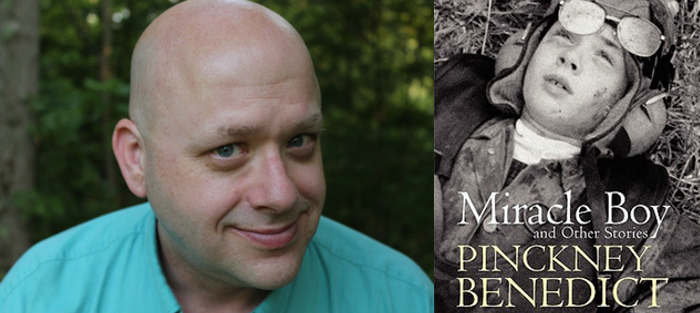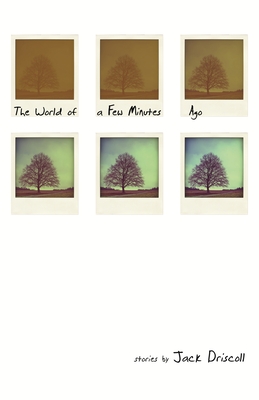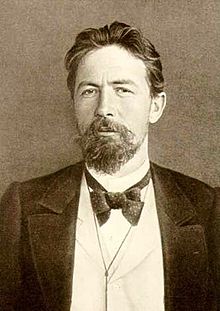In the fall of 1998, I was studying abroad when a friend wrote to tell me that Pinckney Benedict had joined the faculty at Hollins University. I’d heard of Pinckney but hadn’t read him, so I asked my mother to send me his two books of stories, Town Smokes and The Wrecking Yard. I had been contemplating the idea of staying in England for the spring of my junior year, but when I’d read and loved the collections, I came up with a new plan—I would e-mail Pinckney and ask him if I could join his workshop in the spring. If he said yes, I’d go home; if he didn’t have room in his class, I’d stay at Oxford. A few hours or a day later, I had an answer: he’d make sure there was a place for me. It was a lucky break for me, and though I’m sure I missed some good tutorials that spring, a few punts on the Isis, and a few pints at the Lamb & Flag, I haven’t regretted the decision for a second.
What has always impressed me most about Pinckney is the sheer power of his imagination. In workshop, he didn’t often walk us through close readings as other professors did; instead he talked about dreams, about the power of the subconscious, and quoted Aristotle: “With respect to the requirement of art, the probable impossible is always preferable to the improbable possible.” His work exists in the intersection between reality and myth, a place that should be visited rather than described.
And yet it is also work that exists in a specific geographical space—the hills and valleys of Pinckney Benedict’s native West Virginia. As he wrote in the introduction to the anthology Red Holler (Sarabande 2013), “Appalachia is America’s literary id. It is the place where every monstrous or dreamlike thing seems possible, where every carnal fantasy may realize itself unimpeded by human laws, by technology…by the ever‐advancing tide of the generic and the universally familiar.” In this second interview in a series on rural fiction, undertaken in partnership with The Art of the Rural, we talk about the effective use of dialect, wild hogs, and why the dichotomy between literary fiction and genre fiction can be both misleading and dangerous.
Interview:
Mary Stewart Atwell: Since our focus in this series is on rural fiction, I’d like to start with a comment you made in an article in the Chicago Tribune on recipients of the Nelson Algren Award. You explained that you learned that you had won shortly after arriving in Iowa City to begin your MFA, in 1986, and that the validation of that award kept you going when you realized that “fiction with a rural setting was not much approved of there [at Iowa] at the time.” How was that disapproval expressed? Was it representative of a more general attitude in the literary world in the mid-80’s?
Pinckney Benedict: There was, toward me and toward my work, a general kind of curled-lip, disdainful posture. No doubt I deserved it, because I had (and still do, I suppose) a pretty big hillbilly chip on my shoulder.
I recall being told, of a story that took place on the West Virginia-Kentucky border in the late nineteenth century, when animosities left over from the Civil War and rivalries between competing clans were playing themselves out with great and escalating violence, “I feel like I walked in on the middle of a bad Western.” (Isn’t it funny how we remember the slights and the insults and the sneers, years and decades later? If only we were not—if only I were not—made that way.) That’s not a criticism of the prose; that’s an unanswerable critique of subject matter, and it’s meant not to help the writer find a better way to undertake the project at hand, but to shut the project down, to shut the writer up. There was a great deal of that at Iowa, and not just of me, and not just by my classmates. The faculty were also frequently and casually cruel (the students took their attitude from the faculty), and not only when the work wasn’t good.
I also recall the director of the Iowa program telling one of my undergraduate writing teachers that I would be a fine writer, if only I would leave behind that “backwoods” material. Leave behind, then, the material of my life! The center of me. Galling. But those folks were all very sophisticated and knew what it might be worthwhile to write about and what was not worthwhile. And the material that interested me was quite obviously not worthwhile.
It was actually a very valuable lesson, and a powerful test: could I continue to do what I wanted and needed to do when those around me so clearly detested it, and me? Being detested, it turns out, doesn’t bug me all that much (though, as you see, I still carry around all the scars from those long-ago barbs). The real difficulty is to avoid making it into a drug. I recall returning to the end of The Stranger— “…all that remained to hope was that on the day of my execution there should be a huge crowd of spectators and that they should greet me with howls of execration”—and thinking to myself, That’s the real stuff, not to be loved, and not to want to be loved, but to be positively hated. It’s a real temptation to make outsider status into a fetish and a balm.
This was not, by the way, an attitude that I have encountered all that much elsewhere, in the world of publishing and so on. So it was pretty easy after I got my degree to shrug it off as a kind of localized bigotry. One got the feeling that a lot of folks at Iowa were pretty uneasy being in a small city surrounded by rurality, and they made themselves feel more comfortable by circling the wagons and copping big-city attitudes.
Does rural fiction get a different kind of reception today? If so, what has changed?
Particularly lately, I see a lot of marvelous fiction with rural settings and rural characters being published with great frequency and often to great acclaim. Frank Bill is a recent wonderful example. You are another.
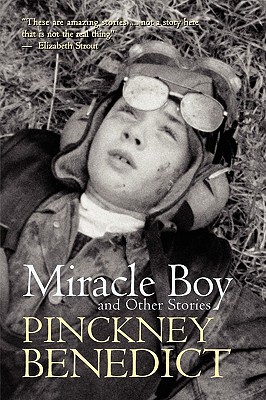 You grew up on a dairy farm in Greenbrier County, West Virginia. When did you realize that you wanted to be a writer? Did you share your ambition with your friends and family? How did they respond?
You grew up on a dairy farm in Greenbrier County, West Virginia. When did you realize that you wanted to be a writer? Did you share your ambition with your friends and family? How did they respond?
I suppose, more than knowing I wanted to be a writer, I knew that I couldn’t ever be a dairy farmer. It wasn’t a matter of not wanting to, of wanting to escape or reject the agricultural life—I was simply thoroughly inept, constantly smashing up the machinery and frightening the livestock And so I looked for pretty much anything else.
Then, in college, I took a fiction class with Joyce Carol Oates, and I was hooked. I have never looked back. My family, upon hearing my ambition, were almost certainly greatly relieved, because there is a much lower likelihood of the amputation of limbs when one is a writer than when one is an inept farmer. My friends were likely not at all surprised, because I was an inveterate storyteller. Most of what I had to say was lies.
Recently someone at a Q&A asked me why, when I mention that a character has a Southern or Appalachian accent, I don’t write the dialogue phonetically. I said I thought it was tremendously difficult to write dialect that sounds genuine and not condescending. In fact, your story “Town Smokes” is one of the only stories I can think of that manages to strike that balance. How do you do it? What do you tell your students about writing in dialect?
I tell them not to, and in fact I haven’t tried it, to any great extent, since that first long-ago book, when I had no idea how difficult such a thing could be. I was simply copying the voice of Madison Smartt Bell’s terrific story “The Naked Lady.” (When I confessed this to him, he told me he had just stolen it from the then-largely-unknown Cormac McCarthy.) Nowadays I primarily confine myself—and I suggest that my students do the same—to using regionally specific syntax and diction to indicate accent. Very occasionally I will use a variant spelling of a word, when the sound seems to me irreplaceable: “everwhere” for “everywhere,” for instance, or “everbody” for “everybody.” “‘Thout” for “without.” That kind of thing. But they’re targeted deviations from the norm.
In your story “Booze,” from the collection Town Smokes, a wild white hog terrorizes an Appalachian farm. There’s also a very scary wild hogs scene in your novel, Dogs of God. Are there really wild hogs in West Virginia? Have you ever run into one?
There are indeed wild hogs in West Virginia. In fact, there are wild hogs pretty much everywhere. I recall some time ago reading a newspaper story about wild hogs rooting up sodded lawns in the suburbs of San Francisco, and plans for a great fence that was going to keep them out. Good luck! Nothing will keep the hogs out. They will be the inheritors of the Earth.
I am tempted to spin you a story about a chance boyhood encounter in the deep forest with a wild hog that left me scarred and terrified and thus writing out my fear and horror for the rest of time, but I’ll restrain the impulse. My father tried his hand at raising hogs one year, and that glimpse of hell—the hog pen, with its stench and its earsplitting noise and the brutal, naked aggression of the hogs—was enough to cause me to fear and respect hogs, both wild and domestic (and escaped domestic hogs return to a feral state in a shockingly brief amount of time), for the remainder of my life.
Love bacon, though.
Rereading your work for this interview, I was struck by how much you seem to know about things like guns and working on cars. There’s a depth of information that really authenticates the character’s experience, while somehow remaining interesting even to readers (like me) who wouldn’t know a nitrous injection system if it hit them in the head. Do you feel that having these interests in common with your characters helps you understand where they’re coming from?
I write exclusively about the subject matter that fascinates me. It happens that I really like cars and guns, to the point of obsession, and so I read about them and I watch YouTube videos (what a gift to writers the internet is!) and I drive all the cool cars I can and I shoot all the cool guns I can, whenever I can. And the guns and cars I don’t or can’t own in real life, I give to my characters as gifts. It’s impossible to grow bored with writing a story when the central objects of that story are at the center of your desires.
I was a serial monogamist with cars all during high school and college, really up until the time I was married and had kids. I would own a car for six months or a year and then trade it for a different one. My best friend’s dad owned a used car lot, and anytime he got in anything interesting—a 1974 Datsun 260Z, a silver 1964 ragtop Chevy Corvair, a 1973 Mustang with incredibly loud Thrush sidepipes and Cragar rims—I’d drive it and see if he’d deal with me on it. We both loved to deal, so I drove a lot of different cars.
I’d say the only knowledge that’s truly important is the knowledge that you would pursue whether you cared to write about it or not. If you love it, then some of that energy will translate into the prose you write about it, and it will communicate even to people who don’t much care about those subjects themselves. It’s why I don’t care much about subject matter, as a writer or a reader or a teacher. I only care that folks write about those things that obsess them completely.
In a 2011 review of your collection Miracle Boy and Other Stories here in Fiction Writers Review, Shawn Andrew Mitchell compares your work to Flannery O’Connor, citing the “anagogical sense” that allows your writing to operate on both a literal and a spiritual level. Like O’Connor, you’re a practicing Christian, and your faith seems particularly to inform the stories in this most recent collection. Can you discuss the part that faith plays in your work? Has it changed or developed over the years?
In a way, it’s like the previous question about cars and guns. I grew up in a community where pretty much everybody was, or at least claimed to be, a Christian. I share Christian upbringing (and the resultant knowledge of scripture, hymns, shibboleths, and so on) and Christian belief (even if it’s frequently a deformed or renegade belief, as my own is) with many of my characters, and so it’s pretty easy to imagine what they might think of, what references they might make, what superstitious beliefs and practices they will fall back on, in any given situation. I don’t have to reach for that stuff. It’s right there at the front of my brain.
What I don’t do, and what I would dislike ever to be taken to be doing, is to proselytize. I’m not a recruiter for Jesus, and I’d be a pretty poor one if I did. I’m much more willing to name my faith these days than I was in years past, and to address questions of faith directly in my work, because I’m old and cranky, with little left to lose, and mostly just disappointed that nobody seems to want to martyr me.
Over the years, we’ve talked a bit about the role of the subconscious in fiction. There are so many moments in Miracle Boy that seem to come straight out of dreams—for instance, the Mudman who comes to represent a character’s darkest desires in the story of the same name, and the truly terrifying half-dog, half-man in “The Beginnings of Sorrow.” Can you talk about why/how the fantastic has come to be so central to your recent work?
I’m sorry to keep coming back to the cars/guns/Jesus answer, but for me it’s all the same thing: I write what I can’t stop writing about, the obsessions that I can’t cure, though maybe I’m trying, hopelessly, to cure them by writing about them. Dreams are one of those obsessions. I suffered from terrible nightmares as a kid (many writers I know tell me it was the same for them), and I still get them occasionally. I learned to love them—what else could one do?—because I relished the feeling of waking up, gasping with terror, and then feeling that incredible, intoxicating wave of relief wash over me: That didn’t really happen.
But it seemed so real! That’s the quality I strive for in all my fiction, the perfection of the dream: that, no matter how outlandish the images in the story, no matter how bizarre the action, how mad the characters, the internal logic of the story is, like the logic of the dream, utterly unbroken and unbreakable. I strive for a story that will swallow you whole, thrust you into an utterly immersive world for a time, replace your reality with one that’s fantastic and seamless, that will terrify you, move you, and leave you gasping when you emerge:Thank God that didn’t really happen!
I think of you as one of the most instinctual and innately talented writers I know, and yet looking back at your books, I see such attention to detail and a painstaking approach to craft. I’m thinking, for example, of this description of a helicopter’s windshield in your novel Dogs of God: “The plastic of the canopy was scratched and milky in places, and the light of the setting sun caught and held in the abrasions, making orange pinwheels that obscured the horizon.” Do you think of yourself as a natural-born writer? How would you describe the balance between imagination and technique in your work?
You’re very gracious, and the beginning of this question makes me blush. Thank you for your kind words. I used to worry about technique a great deal more than I currently do, probably because a lot of that stuff has been internalized, has simply become a part of me. That’s a process that, as you know, begins very early with most writers: we read a great deal, and so we experience what gracious and powerful writing can be like from the time that we can read. I was also lucky enough—to return to our theme of rurality—to grow up in a time and place where there was very little to do in the way of recreation, for a kid who wasn’t much good at sports, except to read. And one of my favorite playthings when I was growing up was my father’s old electric typewriter, which buzzed loudly and jumped like a frightened animal whenever you hit a key. When you held down the period key, which repeated, it would rattle away like a machinegun. So all the elements were there for me to become what I became. That typewriter, with its technological allure, was an important bridge for me in the process of transforming from a reader into a writer.
I am, sadly, not a natural-born anything. I am a slow but determined learner. Another of the virtues of having grown up on a dairy farm: I saw from an early age what hard work was, and I have never much been afraid of it. So there is little (conscious, at least) technique to what I do, but there is a great deal of labor. That’s why I have to love my subject matter, because the writing is so much work.
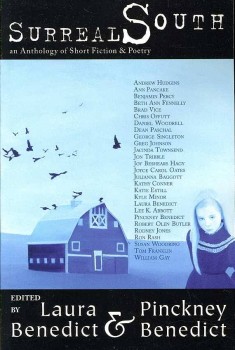 With your wife, the novelist Laura Benedict, you edit an anthology of short fiction called Surreal South that seeks to “bridge the gap between work that is perceived as ‘literary’ and work that is perceived as ‘genre.’” Three volumes have appeared so far. With volumes like Surreal South and with the work of literary writers who draw on elements of genre fiction, the line between the two seems to have shifted a bit in recent years. Are these categories still important, or would you like to see them abolished altogether?
With your wife, the novelist Laura Benedict, you edit an anthology of short fiction called Surreal South that seeks to “bridge the gap between work that is perceived as ‘literary’ and work that is perceived as ‘genre.’” Three volumes have appeared so far. With volumes like Surreal South and with the work of literary writers who draw on elements of genre fiction, the line between the two seems to have shifted a bit in recent years. Are these categories still important, or would you like to see them abolished altogether?
We’ve edited three editions of the Surreal South series, in 2007, 2009, and 2011. The 2013 edition, due out in October, will be edited by my former student, the excellent young writer Josh Woods.
I’ve never cared at all for the categorization of fiction, particularly by subject matter. I enjoy a great deal of what is commonly called “literary” fiction, and I likewise enjoy a great deal of what is called “genre” fiction, and I can’t for the life of me see why one set of subject matters is superior to another. All that matters to me is the story: did the writer take powerful risks? Do they pay off? Is the writing created out of a desperate need to communicate this particular narrative? There’s no subset of subject matter that has a monopoly on the quality of obsession that I prize.
I think some of the recent trend toward “literary” writers indulging in “genre” material is authentic and good, because those people have always been fascinated by the outre and the fantastic and the macabre, as I have; and a great deal of it is opportunistic (“These dullards won’t buy my work about angsty yuppies, but they will surely pick up my zombie novel in droves!”), condescending, and more than a little gross.
You and your wife are both writers. In the years I’ve known you, you’ve raised two children while publishing and teaching full-time. How do you both manage to find time for your own work?
Laura is one of the most disciplined and hardworking writers I’ve ever known. I wish that I had one-tenth of her sticktoitiveness.
My own output in recent years hasn’t been what I wish it had been—I’m too easily distracted and drawn into side paths. There have been fun diversions into, for instance, graphic fictions (I have a graphic piece that’s being reprinted in a book called Red Holler, from Sarabande, fairly soon, a volume of “transgressive” Appalachian fiction for which I also wrote the introduction) and, as you noted, film.
My teaching takes a great deal of my energy and creative thought. I recently attended an event at which Joyce Carol Oates said that she thought of herself primarily as a teacher and always had. She said something along the lines of, “Teaching is my profession. Writing is just something I do.” And I suppose that, these days, I’m understanding that I feel much the same way. If anything of what I am able to create is to live on after me, it is much more likely to do so in my students and in their work than in my own.
Links & Resources
- Read Shawn Andrew Mitchell’s 2011 FWR review of Benedict’s Miracle Boy and Other Stories.
- Be sure to check out Mary Stewart Atwell’s inaugural conversation in this series of interviews on rural fiction, undertaken in partnership with The Art of the Rural, with Michigan author Jack Driscoll.
- You can also read earlier interviews with Benedict in The Rumpus, Pif, and The Nervous Breakdown.
- Watch the “Miracle Boy” short film (password: HappyHolidays2012).
- Pick up a copy of the anthology Red Holler from Sarabande Books.

